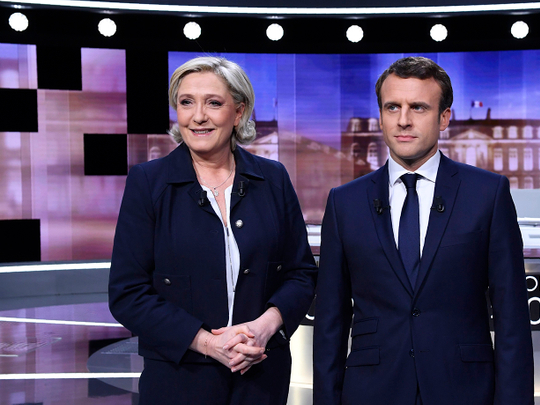
More than 48 million French citizens are entitled to cast ballots in the first round of the presidential elections — a pivotal moment in determining the future course of Europe’s second largest economy and only nuclear-armed nation.
While 12 candidates are running in this initial stage, only the top two will go ahead to battle for the presidency in the second round of voting on April 24. And as things stand now, this first round of voting looks as if incumbent Emmanuel Macron and right-wing National Rally leader Marine Le Pen will contest that ballot. There is also an outside chance that leftist Jean-Luc Melenchon might pip Le Pen.
All indications on Sunday pointed to a lower-than-expected voter turnout, perhaps showing that voters believe that the first round is a foregone conclusion, with Macron and Le Pen set to win.
The last opinion polls published on Thursday gave Macron 26.5 per cent support, with Le Pen at 23 per cent and trending upwards. Ten days ago, Melenchon was at 16 per cent but also gaining support — unlikely though that he will be able to catch the two frontrunners.
Gruelling for incumbents
French politics is particularly gruelling for incumbents, and Macron is trying to become only the first French president in two decades to be returned to the Elysee Palace.
Five years ago, Macron swept to power, brushing aside Le Pen’s second round challenge with the support of three voters out of every five. Opinion polls suggest that should Macron face off again against Le Pen, the outcome would indeed be similar — exactly the expectation that has led to low voter turnout in Sunday’s first round of police.
Should Le Pen finish second and head into the final vote in two weeks’ time, it will be her third consecutive final ballot. This time around, her National Rally party has rebranded itself and adopted a more mainstream message.
Events in Ukraine have dominated the campaign with Macron taking a leading European role to try and broker peace talks and to rally European Union support behind Kyiv. He has spent little time on the campaign trail.
Voters in France, however, are preoccupied with the spiralling cost of living driven by energy prices and broad inflation stemming from costs associated with the fallout from the coronavirus pandemic.
Come April 24, voters will be more focused on the decisive race and will need to be convinced by either candidate that they have the plans and abilities to temper the cost of living, protect most elements of France’s generous welfare and benefits system, and grow the economy.








